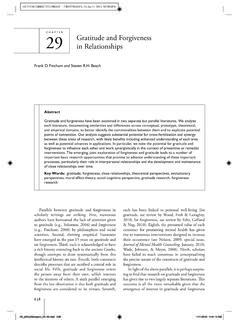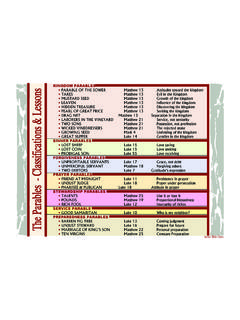Transcription of FORGIVENESS: Tools to Transform Suffering into Wholeness
1 forgiveness : Tools to Transform Suffering into WholenessPatrick Arbore, & Director, Center for Elderly Suicide Prevention and Grief Related Services, Institute on Aging, San Francisco, CA12 Center for Elderly Suicide Prevention& Grief Related Services (CESP)CESP is a program of Institute on Aging, San Francisco. It is an accredited crisis intervention hotline/warm-line telephone programCESP s PRIMARY service is the 24-hour Friendship Line, which began in 1973. (800) 971-0016 Nat l Line 24/hr Friendship Line for people 60+ and younger disabled adults Grief Services for people of any age Director & Founder of forgiveness in Psychology and Social Sciences1932 to1980 Many theoretical papers; modest empirical work Freud wrote nothing about forgiveness Mental health leaders gave little attention to forgiveness1980 to Present Intense and serious consideration given to concept of forgiveness by researchers and mental health professionals3 Academic Study of forgiveness Neglected Because.
2 Traditionally forgiveness linked to religion; social sciences avoided religious matters. Difficulties in gathering reliable data about forgiveness . 20th century was the bloodiest and perhaps most unforgiving century human Adults and forgiveness Reasons to study forgiveness in older age: Ability to forgive might be subject to developmental changes across the life span forgiveness might carry a different significance in old age forgiveness might be helpful for reflecting on and understanding lifeAllemandet al (2013) 5 Unforgiveness and Physical Health Unforgiveness has been consistently related to poorer health in published research Unforgiveness is a common stress reaction that is detrimental to well-being Older adults may experience many interpersonal transgressions that can be stressful particularly when responded to with unforgiveness 6 Unforgiveness, Older Adults, and Mental Health Depression is one of the most common sources of Suffering for older adults Understanding the factors that contribute to depression in older adults is important as we seek to prevent or remediate these symptoms of depression An older adults inability to forgive themselves may result in enduring ruminations that lead to or exacerbate depressive symptoms7 What does forgiveness mean to you?
3 8 Definitions of forgiveness Researchers have not been able to achieve a shared goal of establishing a unified definition of forgiveness9 Definitionsof forgiveness Love s revolution against life s release ourselves from our own painful pasts (Smedes, 1984) Intra-individual, prosocial change toward a perceived transgressor that is situated within a specific interpersonal context (McCullough, Pargament & Thoreson, 2000)10 forgiveness involves .. Conscious effort Letting go of resentment, anger, and revenge Understanding the person and feeling compassion Emotional relief for the person who was hurt; it s not about the person who did the ContinuedAccording to Butterworth (Life is for Loving): We cannot endure without love and there is no other way to the return of healing, comforting, harmonizing love than through total and complete forgiveness : If we want freedom and peace and the experience of love and being loved, we must let go and forgive.
4 12 forgiveness ContinuedAccording to Hooks (All About Love): forgiveness is an act of generosity. It requires that we place releasing someone else from the prison of their guilt or anguish over our feelings of outrage or anger. By forgiving we clear a path on the way to love. It is a gesture of respect. True forgiveness requires that we understand the negative actions of another. 13 Safer, 1999 forgiveness demands every mental, moral, and spiritual resource you have. Like love, it never stays the same, never ends, and deepens over the years. forgiveness is hard, painful work that can take a lifetime. 14 forgiveness is NOT.. Forgetting what happened Condoning or excusing the behavior Reconciliation with the person15 forgiveness also is NOT.. Pardon, legal mercy, leniency Justification Balancing scales Becoming disappointed Self-centering16 Common Colloquialisms Confused with forgiveness .
5 forgiveness is a quick fix I ve accepted what happened I accept what happened, knowing that God will punish him/her I have moved on I have the satisfaction of not letting the person get to Enright & FitzgibbonsHelping Clients Forgive, 200017 Thinking That May be Accurate But Incomplete Letting time heal the wound Abandoning resentment Possessing positive feelings Saying I forgive you Making a decision to forgive18 According to Simon (1991)Many people awaken in the morning and fill an enormous suitcase with pain from the past. We stuff it with grudges, bitterness, resentment, and self-righteous anger. We toss in self-pity, envy, jealousy, and regret. We add every injury and injustice that was ever done to us. Then we shut that suitcase and drag it with us wherever we go. 19 Why consider forgiving a person who has hurt you?20 The decision to forgive can be prompted by.. Religious conviction Personal morality Psychological distress21 Benefits ofForgiveness Decrease in anxiety, depression, and hostility Increase in hope, self-esteem, and well-being Helps keep relationships steadfast22 What is forgiveness ?
6 forgiveness is the accomplishment of mastery over a wound. It is the process through which an injured person first fights off, then embraces, then conquers a situation that has nearly destroyed him/her. Flanigan, B. 1992 Forgiving the UnforgivableNew York, Macmillan23 Arguments Against Forgiving It s dishonest because it denies reality. It s wrong because it contradicts human nature. Our nature is to get even. It glosses over the enormity of evil and stifles the call from the bowels of the earth for just vengeance. L. Smedes, The Art of Forgiving24 Not Forgiving .. A fairly new concept It s not avoiding forgiveness or retreating into paranoia. It s a legitimate action in itself. To withhold forgiveness for the right reasons is a decision as hard-won as to grant it. Intent is the critical factor in determining whether forgiveness is possible or justified. Sometimes people need permission not to forgive, to feel what they Unforgivable Injury.
7 Starts with a singular event that signals a betrayal Initiated by intimate injurers, not strangers Moral wounds Assaults a person s most fundamental belief systems Deeply personal B. Flanigan, Forgiving theUnforgivable, 199226 Friends &Co-WorkersUnforgivable injuries by co-workers can wound as deeply as those of our children, spouses and a person asks us for forgiveness .. The person is also asking for permission to forgive him/herself. We seek forgiveness for: What we did Specific things we did not do Wrongful things we did for which we deserve blame What we blame ourselves forL. Smedes, The Art of Forgiving28 Therapeutic Role of forgiveness There has been a lot of interest from researchers recently regarding forgiveness as a therapeutic tool forgiveness interventions can have the capacity to improve general positive affect as well as self-esteem, which is sustained in the long term Some studies have suggested that forgiveness is associated with lower levels of anxiety, depression, anger, and perceived stress29 Models of forgiveness Motivational Model Focuses on forgiveness within the context of interpersonal relationships individuals work towards forgiving a transgressor out of consideration for the health of a relationship rather than out of self-interest30 Models Continued The REACH Model An emotion-focused coping strategy Emotional forgiveness refers to the cessation of feelings of hurt.
8 Resentment and hostility arising from a transgression it is an altruistic gift to the transgressor Recall the hurt; empathize with your transgressor; altruistic gift; commit; hold onto your forgiveness 31 Models Continued The Process Model forgiveness is a voluntary and unconditional act whereby one relinquishes negative feelings, thoughts, and behaviors while fostering feelings of compassion, generosity and love towards an undeserving transgressor this model requires the spontaneous development of loving feelings for the transgressor as an essential facet of the construct32 Six Steps of Forgiveness1 Recognize the injury2 Identify the emotions involved3 Express your anger and hurt4 Set boundaries to protect yourself5 Cancel the debt6 Consider the possibility of reconciliationStoop and Masteller, 199133 Step 1: Recognize the injury Whom do you need to forgive? How have they hurt or injured you?
9 Describe what 2: Identify the emotions involved List feelings you have about what happened. Hate and Love:Hurt people feel hate along with love. Sadness:Important to acknowledge the extent of one s sadness and to grieve Self-blame:In unforgivable injuries is to be expected. Competing emotions weary the 3: Express your anger and hurt If I could say what I wanted to this person(s), I would say ..36 Step 4:Set boundaries to protect yourself List what you can do to protect yourself, both now and in the future Take the time to talk with someone you trust about what you have written or will write Ask them to help you to be thorough in steps 1-3 and realistic in step 4 Take time before moving on to the next step37 Step 5: Cancel the debt When you have released the other person from your own expectations, you are ready to forgive to cancel the debt Write down something you can do to symbolize your willingness to forgive38 Step 6:Consider thepossibility of reconciliation Why do you want reconciliation?
10 If you approach the other person(s), what do you think will be the response? Can you accept the worse possible response? How can you check to see if the other person(s) is open to working through their part of the reconciliation process?39 Forgiving OurselvesFour questions to it make sense to forgive ourselves? gives us the right to forgive ourselves? do we forgive ourselves for? can we go about forgiving ourselves?40 Obstacles to Self- forgiveness Individuals who have committed a transgression believe they are not forgiven by the people whom they have hurt Individuals believe that God does not forgive them An inability on the part of an individual to accept their own imperfections or change their own unattainable standards 41 Five Tips to Self ForgivenessAccording to Smedes: We tell it to ourselves I forgive me. We repeat it We keep it to ourselves We act like it even if we don t talk about it We do something extravagant42 Unforgiveness as a Cold Emotion Unforgiveness involves feelings of resentment, bitterness, and even hatred43 What is Hate?







